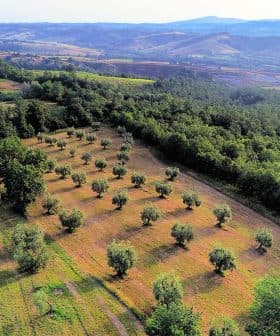Spain's Dcoop Acquires Stake in California Table Olive Producer Bell-Carter
Spain's largest olive oil cooperative and its Moroccan partner have acquired 20 percent of the company partially responsible for U.S. tariffs on Spanish olives in an effort to avoid paying them.
Dcoop and Devico have purchased a 20 percent stake in Bell-Carter, a California-based table olive producer, with plans to increase their ownership to 50 percent in the future. The acquisition is seen as a strategic move to avoid tariffs on Spanish table olives imposed by President Donald Trump, with Dcoop planning to ship olives from Spain to the U.S. for oxidation to avoid tariffs.
Dcoop and its Moroccan partner, Devico, have purchased a 20 percent stake in the California-based table olive producer, Bell-Carter, Inc.
We will ship our product from Spain, but the oxidation process for the production of the black olives will take place (in the U.S.), so they will be exempt from the payment of the tariffs.
“With this agreement, Dcoop strengthens its position in the U.S. table olive market, boosting the commercialization of the production of its 26 associated entities that currently stands at around 100,000 tons,” the cooperative wrote in a press release on its website.
According to sources close to the cooperative, if “everything works out as planned” Dcoop and Devico will increase their ownership stake in Bell-Carter to 50 percent in the coming years.
Colleen Morris, the general manager of Bell-Carter, told Olive Oil Times that the California-based company was not open to selling an additional stake to the Spanish cooperative.
“Bell-Carter Foods has sold a 20 percent stake of the company to Dcoop to secure the deal and has no plans to increase this equity position,” she said.
The acquisition is widely seen as an effort for Spain’s largest cooperative of olive oil producers to avoid the tariffs imposed on Spanish table olives by President Donald Trump. According to Antonio Luque, Dcoop’s president, the cooperative will ship the black olives to the United States and allow them to oxidate there.
“We will ship our product from Spain, but the oxidation process for the production of the black olives will take place [in the U.S.], so they will be exempt from the payment of the tariffs,” Luque said.
Angelique Hardin, a spokeswoman for Bell-Carter, denied that this was the case stating that the sale was an opportunity for Bell-Carter to immediately increase their ripe olive volume.
Bell-Carter was one of the two companies that lodged an anti-dumping complaint to the U.S. International Trade Commission, which was one of the factors that led to the Trump Administration’s 37.4 percent tariff on black olives.
In Spain, the effects of the tariffs have already been felt. According to the Spanish Association of Exporters and Industrialists of Table Olive (Asemesa), Spanish table olive exports to the U.S. had fallen by 40 percent in the first five months of 2018, compared with the same period last year.
“Our position, as part a of Asemesa, on tariffs is the same and we will continue to fight for their elimination, but this is a business operation,” Luque said.
“We have confidence in increasing sales of Bell-Carter in the coming years, that would also mean increasing our production by 10,000 or 20,000 tons for export to the U.S.”
Dcoop currently exports about 7,700 tons of black and green olives to the United States, both packaged and in bulk. Of this total, 4,400 tons are black olives and subject to the 37.4 percent tariff. The cooperative estimates that it will soon send more than 33,000 tons to the United States via Bell-Carter, making up half of Dcoop’s and Devica’s current table olive sales.
As part of the deal, Dcoop and Devica will exclusively supply Bell-Carter with their olives. “[The plan] is to carry all the olives that can be brought from here to the United States, either in bulk or packed,” Luque said.
Acorsa USA, an American subsidiary of Dcoop, will also be “integrated” into Bell-Carter’s structure.
According to Luque, the aim of the purchase is to follow the Pompeian model. Pompeian is the largest American importer of olive oil and is also half-owned by Dcoop and Devico.









